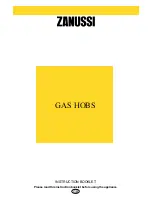
Environmental protection
en
7
7
Environmental protection
Environmental protection
In this section, you can find information about saving
energy and disposing of the appliance.
Energy-saving advice
■
Always use the correct lid for each pan. Cooking
without a lid uses a lot more energy. Use a glass lid
to provide visibility and avoid having to lift the lid.
■
Use pans with flat bases. Bases that are not flat use
a lot more energy.
■
The diameter of the pan base must match the size of
the hotplate. Please note: pan manufacturers usually
provide the diameter for the top of the pan, which is
usually larger than the diameter of the pan base.
■
Use a small pan for small amounts of food. A large
pan which is not full uses a lot of energy.
■
Use little water when cooking. This saves energy and
preserves all the vitamins and minerals in
vegetables.
■
Select the lowest power level to maintain cooking. If
the power level is too high, energy is wasted.
Environmentally-friendly disposal
Dispose of packaging in an environmentally-friendly
manner.
f
Induction cooking
Induction cooking
Advantages of induction cooking
Induction cooking is very different from traditional
cooking methods, as heat builds up directly in the item
of cookware. This offers numerous advantages:
■
Saves time when boiling and frying.
■
Saves energy.
■
Easier to care for and clean. Spilled food does not
burn on as quickly.
■
Heat control and safety – the hob increases or
decreases the heat supply as soon as the user
changes the setting. The induction hotplate stops the
heat supply as soon as the cookware is removed
from the hotplate, without having to switch it off first.
Cookware
Only use ferromagnetic cookware for induction cooking,
such as:
■
Cookware made from enamelled steel
■
Cookware made from cast iron
■
Special induction-compatible cookware made from
stainless steel.
To check whether your cookware is suitable for
induction cooking, refer to the section on
To achieve a good cooking result, the ferromagnetic
area on the base of the pan should match the size of
the hotplate. If a hotplate does not detect an item of
cookware, try placing it on another hotplate with a
smaller diameter.
If the only hotplate being used is the flexible cooking
zone, larger cookware that is particularly suited to this
zone can be used. You can find information on
positioning cookware in the section on
This appliance is labelled in accordance with
European Directive 2012/19/EU concerning
used electrical and electronic appliances
(waste electrical and electronic equipment -
WEEE). The guideline determines the
framework for the return and recycling of used
appliances as applicable throughout the EU.
FP
FP
FP








































